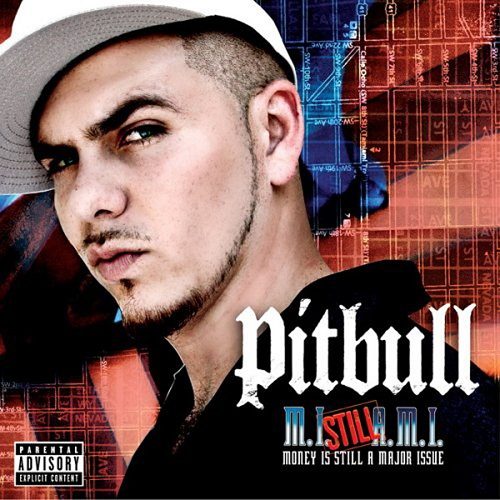A possible explanation for Pitbull’s success is his audience. I’m not talking about how devoted his fanbase is, but the sheer number of people who could listen to him. His music contains traces of hip-hop, exemplified in his work with Lil’ Jon. It is best described as Reggaeton, though, and his reliance on Spanish as well as English extends his potential fanbase even further. A simpler explanation is this: he has a damn fine sense of what makes heads bob in the club. Even someone like me, who never turns on the radio, managed to hear his megahit “Culo” several more times than I wanted to.
Pitbull went gold with his debut album “M.I.A.M.I.” The clever acronym Money Is A Major Issue highlighted both the region he intended to represent and his ultimate goal in the music game. I would have thought that going gold would have cured Pitbull of his money problems, but apparently it is STILL a “Major Issue.” The semi-follow-up “Money Is Still A Major Issue” is an entirely different album, but it serves only to bridge the gap to his sophomore effort, “Mariel.” The majority of the thirteen tracks are songs that he has been featured on. The most notable to rap fans, aside from an intriguing Lil’ Flip appearance, is the “Shake” remix by the Ying Yang Twins featuring Pitbull and Elephant Man. Mr. Collipark and Tom Slick hook up a thick groove for the artists to sing/rap over, and the intensely rhythmic chorus is infectious in the best possible way.
The “Culo” remix is a necessary inclusion, and Lil’ Jon does a 180 from his crunk roots to hook up a stealthy drum beat that allows Pitbull and guest Ivy Queen to rule the track. This music is the epitome of catchiness, and even the listeners who cannot understand any of the Spanish in the hook will be pleased. It’s not as if much of pop radio has much lyrical significance anyway, so there is not much lost. All that matters is that the beat is subtly penetrating and that you’ll walk away shouting “culo” along with everyone else.
By about midway through, it becomes clear that this is simply a collection of music, not a structured record. Oddly, though, since nearly every track is geared for the clubs, and the lyrics are uniformly focused on the same goal, monotony sets in. “Mil Amores,” a Master Joe & O.G. Black song featuring Pitbull, is bland, set apart only by a typically catchy hook. A “Bombs Over Baghdad” style drum pattern takes over in places, and it is downright irritating. Little things begin to stand out more than they should, such as the mechanical voice on the hook to “She’s Hotter” by T.O.K. Here, the distorted vocals are not remarkable, but alongside the constant singsong choruses of most of the record they are a relative boon.
Rich Boy’s “Get to Poppin” remix is driven by bizarre wailing vocal samples, and the slowed tempo is a pleasant surprise. This is the closest to a true rap song on “Money Is Still A Major Issue,” and the “Top Billin'” interpolation on the hook seems to recognize this. “Might Be The Police” is in a similar vein, a grandiose combination of horns and Neptunes stuttering bass hits. A slithering synth is the perfect addition here, elevating the track from potentially boring to riveting.
Pitbull is not the most remarkable lyricist, but he ably navigates every track with flair that explains his success with record sales. He doesn’t really say anything weighty in English or Spanish, but his melodic rapping fits the vibrant, repetitious production that exists uniformly throughout. The replay value of this music is low because of its fluffy content, but it is also easy to throw on and ignore, and “Money Is Still A Major Issue” is a great record to have floating through the speakers at a party. It has spiked my modest expectations for Pitbull’s sophomore album, because this potentially monotonous record is more exciting than I thought it would be. If Pitbull keeps it up, money will be the last thing he has to worry about.

